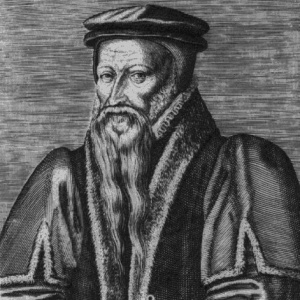Difference between revisions of "Beza, Theodore (1519-1605)"
| [unchecked revision] | [checked revision] |
GameoAdmin (talk | contribs) (CSV import - 20130820) |
m (Text replace - "<em class="gameo_bibliography">Mennonitisches Lexikon</em>" to "''Mennonitisches Lexikon''") |
||
| (2 intermediate revisions by 2 users not shown) | |||
| Line 1: | Line 1: | ||
| − | [[File:Theodore_de_Beze.jpg|300px|thumb|right|''Theodore Beza. Source: | + | [[File:Theodore_de_Beze.jpg|300px|thumb|right|''Theodore Beza. Source: |
| − | [http://en.wikipedia.org/wiki/File:Theodore_de_Beze.jpg Wikimedia Commons] | + | [http://en.wikipedia.org/wiki/File:Theodore_de_Beze.jpg Wikimedia Commons]'']] Theodore (Theodoras) Beza (Théodore de Bèze or de Besze), b. 24 June 1519, d. 13 October 1605 was the successor to [[Calvin, John (1509-1564)|Calvin]] in [[Geneva (Switzerland)|Geneva]]. He was a violent opponent of the [[Anabaptism|Anabaptists]], whereas he warmly defended the persecuted [[Waldenses|Waldenses]] and Huguenots in [[France|France]]. In 1557 he undertook a long journey with [[Farel, Guillaume (1489-1565)|Guillaume Farel]] in order to win the Protestant cantons of [[Switzerland|Switzerland]] and the Protestant princes of [[Germany|Germany]] to make a joint intercession to the King of France for the menaced Waldenses in Piedmont. Still more zealously he defended the French Huguenots. On the other hand, he showed no appreciation for the Anabaptist movement. He saw in the Anabaptists only heretics of the worst kind, who "preach community of women, refuse the oath, want to remove the government, and in the face of all that consider themselves sinless." To resist them he advocated the severest penalties, including death. This he stated in his famous booklet, De <em>hœreticis a civili magistrate puniendis</em> (Concerning Heretics Who Should Be Punished by the Government), which was published in 1554 and was translated into many languages. Beza called the idea of religious freedom a "devilish dogma," and a "Mohammedan dogma." |
| − | |||
| − | '']] Theodore (Theodoras) Beza (Théodore de Bèze or de Besze), b. 24 June 1519, d. 13 October 1605 was the successor to [[Calvin, John (1509-1564)|Calvin]] in [[Geneva (Switzerland)|Geneva]]. He was a violent opponent of the [[Anabaptism|Anabaptists]], whereas he warmly defended the persecuted [[Waldenses|Waldenses]] and Huguenots in [[France|France]]. In 1557 he undertook a long journey with [[Farel, Guillaume (1489-1565)|Guillaume Farel]] in order to win the Protestant cantons of [[Switzerland|Switzerland]] and the Protestant princes of [[Germany|Germany]] to make a joint intercession to the King of France for the menaced Waldenses in Piedmont. Still more zealously he defended the French Huguenots. On the other hand, he showed no appreciation for the Anabaptist movement. He saw in the Anabaptists only heretics of the worst kind, who "preach community of women, refuse the oath, want to remove the government, and in the face of all that consider themselves sinless." To resist them he advocated the severest penalties, including death. This he stated in his famous booklet, De <em>hœreticis a civili magistrate puniendis</em> (Concerning Heretics Who Should Be Punished by the Government), which was published in 1554 and was translated into many languages. Beza called the idea of religious freedom a "devilish dogma," and a "Mohammedan dogma." | ||
= Bibliography = | = Bibliography = | ||
| − | Hege, Christian and Christian Neff. | + | Hege, Christian and Christian Neff. ''Mennonitisches Lexikon'', 4 vols. Frankfurt & Weierhof: Hege; Karlsruhe: Schneider, 1913-1967: v. I, 215. |
Hoffmann, Heinrich. <em class="gameo_bibliography">Reformation und Gewissensfreiheit</em>. Giessen: Töpelmann, 1932: 23, 37. | Hoffmann, Heinrich. <em class="gameo_bibliography">Reformation und Gewissensfreiheit</em>. Giessen: Töpelmann, 1932: 23, 37. | ||
Latest revision as of 23:17, 15 January 2017

Theodore (Theodoras) Beza (Théodore de Bèze or de Besze), b. 24 June 1519, d. 13 October 1605 was the successor to Calvin in Geneva. He was a violent opponent of the Anabaptists, whereas he warmly defended the persecuted Waldenses and Huguenots in France. In 1557 he undertook a long journey with Guillaume Farel in order to win the Protestant cantons of Switzerland and the Protestant princes of Germany to make a joint intercession to the King of France for the menaced Waldenses in Piedmont. Still more zealously he defended the French Huguenots. On the other hand, he showed no appreciation for the Anabaptist movement. He saw in the Anabaptists only heretics of the worst kind, who "preach community of women, refuse the oath, want to remove the government, and in the face of all that consider themselves sinless." To resist them he advocated the severest penalties, including death. This he stated in his famous booklet, De hœreticis a civili magistrate puniendis (Concerning Heretics Who Should Be Punished by the Government), which was published in 1554 and was translated into many languages. Beza called the idea of religious freedom a "devilish dogma," and a "Mohammedan dogma."
Bibliography
Hege, Christian and Christian Neff. Mennonitisches Lexikon, 4 vols. Frankfurt & Weierhof: Hege; Karlsruhe: Schneider, 1913-1967: v. I, 215.
Hoffmann, Heinrich. Reformation und Gewissensfreiheit. Giessen: Töpelmann, 1932: 23, 37.
Paulus, Nikolaus. Beza im Kampf gegen die Vertreter der Toleranz, in scholarly supplement of Germania (1910): Nos. 36, 37.
| Author(s) | Christian Neff |
|---|---|
| Date Published | 1953 |
Cite This Article
MLA style
Neff, Christian. "Beza, Theodore (1519-1605)." Global Anabaptist Mennonite Encyclopedia Online. 1953. Web. 16 Apr 2025. https://gameo.org/index.php?title=Beza,_Theodore_(1519-1605)&oldid=143941.
APA style
Neff, Christian. (1953). Beza, Theodore (1519-1605). Global Anabaptist Mennonite Encyclopedia Online. Retrieved 16 April 2025, from https://gameo.org/index.php?title=Beza,_Theodore_(1519-1605)&oldid=143941.
Adapted by permission of Herald Press, Harrisonburg, Virginia, from Mennonite Encyclopedia, Vol. 1, p. 321. All rights reserved.
©1996-2025 by the Global Anabaptist Mennonite Encyclopedia Online. All rights reserved.
